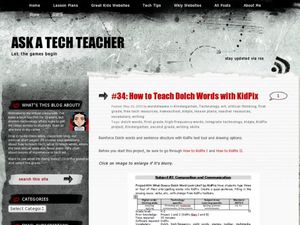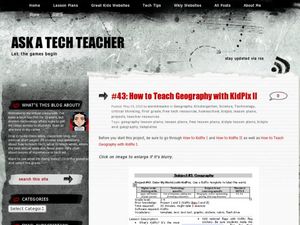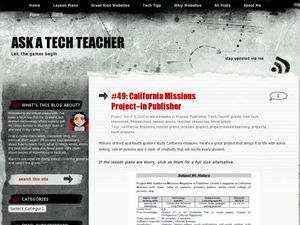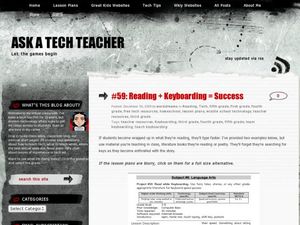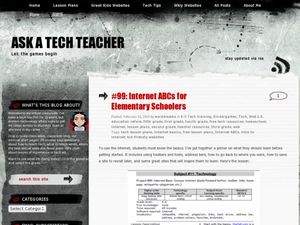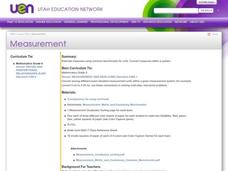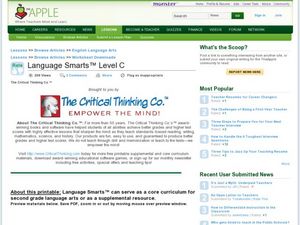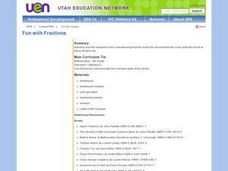Curated OER
How to Teach Dolch Words with Kid Pix
Young scholars use KidPix computer program to learn Dolch sight words. In this technology and language lesson, students type their Dolch sight words into KidPix to create a quasi-sentence.
Curated OER
How to Teach Geography with KidPix II
Students use the computer program KidPix II to color a map of the world. In this world map lesson plan, students fill in different colors for different continents that are told to them on the program KidPix II.
Curated OER
California Missions Project-Using Publisher
Learners create a California Missions magazine that includes a Table of Contents, pictures, and websites. In this culture and history lesson, students research missions and write and create a magazine article about it.
Curated OER
History Trifold in Publisher
Students create a timeline of events happening around the world. In this timeline lesson plan, students use Microsoft Publisher to create a timeline of events happening around the world as they live their lives presently.
Curated OER
Reading + Keyboarding= Success
Young scholars practice their keyboarding skills. For this typing lesson, students use interesting stories to practice their skills. They practice throughout the semester and then monitor their improvement.
Curated OER
Tessellations in Excel
Students complete an Excel project on tessellations. In this technology and math lesson, students discuss tessellations and their occurrences in nature. Students use the Excel computer program to create tessellations.
Curated OER
Animal Characteristics
Pupils create a graphic organizer to study animal characteristics. In this animal characteristics lesson plan, students use a program in Microsoft Word to create a brainstorm about different animal characteristics.
Curated OER
Internet ABC's for Elementary Schoolers
Students develop basic Internet skills. In this lesson introducing the basics of the Internet, students discover how to use toolbars, address bars, how to save a website to revisit later, and how to use the back and forward buttons. This...
Curated OER
Don't Print Homework-Email It!
Learners practice emailing their homework. In this technology instructional activity, students review how to type an email address correctly and how to send it to the correct address. Learners complete their homework and send it to their...
Curated OER
Know Your Computer Hardware #103
Students discover the different terms and parts of a computer's body. In this computer basics lesson, students become familiar with the parts of the computer, starting in kindergarten and increasing their knowledge through school. ...
Curated OER
Measurement
Students explore the concept of measurement. In this measurement lesson, students discuss what specific measurement tools such as an odometer measure. Students recite a measurement poem. Students make a foldable with conversion units...
Curated OER
Writing: Revision
Looking for a worksheet on editing and revising punctuation? In this writing skills worksheet, young writers read a writing sample and identify the punctuation, spelling, and grammatical errors in the selection.
Curated OER
Measuring Activities
Students measure using both metric and standard measures. They convert from one standard to the next while measuring distances in their home or classroom.
Curated OER
Solar Cell Simulation
Students study photovoltaic technology. In this photovoltaic technology lesson, students simulate a photovoltaic system. Students discuss how to simulate a cloudy day.
Curated OER
Clicking Your Way to Poetry: Composing Word Association Poems with the Visual Thesaurus
Use a Visual Thesaurus to compose word association poems. Discuss poetry and word association, create word maps, then practice creating poems based on playful word associations. A perfect way to celebrate "Poem in Your Pocket Day" (April...
National Constitution Center
Address America: Your Six-Word Stump Speech
Stump speeches are the focus of this exercise that combines politics and language arts. After learning about this type of speech, the class listens to Obama's 2008 presidential campaign stump speech and answers a series of questions that...
Curated OER
Digging Into Science Lesson Plans
In this biology worksheet, learners identify and write the various species that are still present today. Then they define evolution using three words. Students also describe what a fossil is and give some examples related to a particular...
Curated OER
New: Fun with Fractions
Third graders determine that the larger the denominator the more parts the whole is being divided into. They use fractions to communicate and compare parts of the whole. They discover what the numerator and denominator of a fraction...
Curated OER
Stone Soup: Acting Out the Story
In this literature worksheet, students read a text called Stone Soup. Students then cut out cards with soup ingredient pictures and act out the story, putting the cards in a soup pot as the item is mentioned.
Curated OER
Some People Just Don't Get It
In this daily mind builders worksheet, students use inferential reasoning and deduction. Students read a short passage and respond to 6 short answer questions stating their own opinion and providing evidence to support their conclusion.
Curated OER
TECH:Introduction to Programming (IT)
Students complete an activity that illustrates the concepts of giving accurate instructions and computer programming. They also identify the relationship of the instructions/code to computer programming. Students then create a peanut...
Curated OER
Cartoons for the Classroom: 2004 Presidential Election
In this current events activity, students analyze a political cartoon about the 2004 election and respond to 5 short answer questions.
Curated OER
The Great Grizzly
Learners generate questions about grizzly bears and use the Internet to research the answers. As a culminating activity, students create a life-size mural of a grizzly that is annotated with the information they've learned.
Curated OER
Soccer Fever Gets Hot
Students examine rules of soccer, focusing on basic skills necessary to play, create imaginary team, match players with positions that best fit their skill levels and personalities, and practice new skills with classmates.


